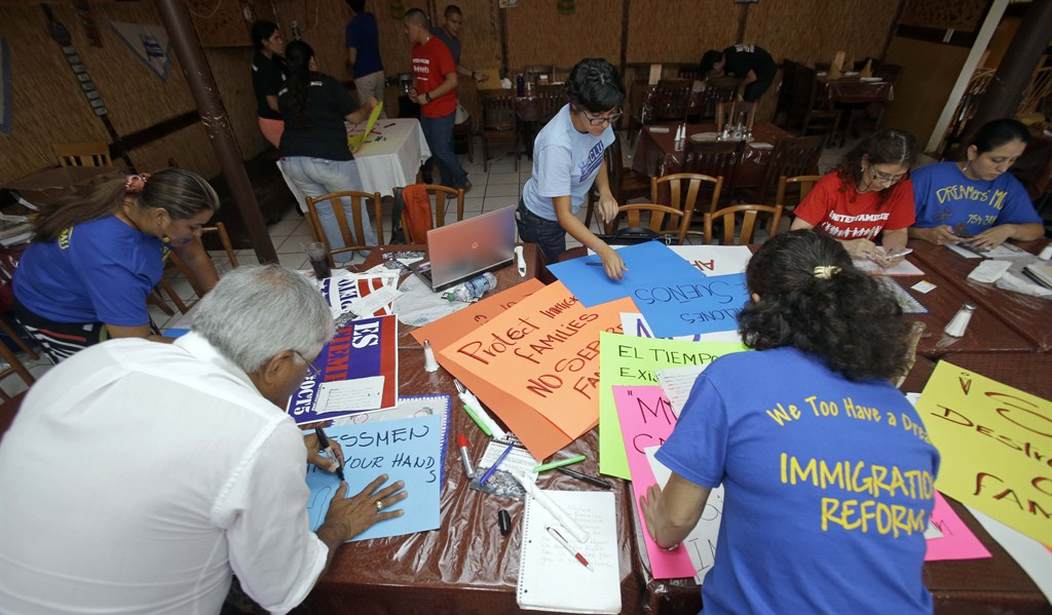Beneath it all was another factor, never far from lawmakers' minds, but much less discussed: the electoral effects of reform. Yes, there was a lot of talk about the Republican Party's need to improve its image with Hispanic voters. But the real political issue underlying the debate went far beyond that. Everyone knew the far-reaching Gang of Eight reform proposal passed by the Senate would reshape the American electorate. And now, a new report suggests just how extensive that reshaping could be.
"Based on projections published by the Congressional Budget Office, we estimate that if (the Gang of Eight bill) were to become law it will add more than 17 million new potential voting-age citizens by 2036," writes scholar Steven Camarota of the Center for Immigration Studies, which opposes the Gang of Eight reform. "These potential voters are in addition to the nearly 15 million that the current level of legal immigration will add by 2036. Combined, current immigration plus the effects of (the Gang of Eight bill) would add more than 32 million potential new voting-age citizens by 2036."
If anyone needs a reminder of how significant that would be, Camarota notes that "the last four presidential elections were decided by 4.5 million votes on average." Adding 17 million new voters -- on top of the 15 million who will come through existing legal immigration channels -- is a big, big deal.
It's a good deal for Democrats, since a wide range of research has shown immigrants and their offspring largely favor the party's approach to governance. In 2012, for example, the Pew Research organization asked whether Americans "would rather have a smaller government providing fewer services or a larger government providing more services." Hispanic Americans favored larger government by a 75 percent to 19 percent split. Even Hispanics who have been in the United States for three generations or more favored bigger government by 58 percent to 36 percent.
Recommended
Among Asian-Americans, Pew found preference for larger government by a 55 percent to 36 percent split. By comparison, white evangelical Protestants, a mainstay of the Republican party, favored smaller government by a 71 percent to 20 percent split.
On a more specific issue -- support for Obamacare -- surveys have shown that both Hispanic-American voters and Asian-American voters favor the national health care law by substantial amounts.
For Republicans, the painful results of the 2012 presidential race -- Hispanic-American voters chose Barack Obama over Mitt Romney by a 71-29 split, while Asian-American voters chose the president by a 73-26 split -- were a stark reminder that the GOP must improve its standing with those groups. But the results of the new study show why Republicans are so sharply divided over whether comprehensive immigration reform should be part of that effort.
Some advocates of comprehensive reform have been positively apocalyptic in their predictions. When Republican Sen. Lindsey Graham, a member of the Gang of Eight, was asked last June about the GOP's 2016 presidential field, he responded, "If we don't pass immigration reform, if we don't get it off the table in a reasonable, practical way, it doesn't matter who you run in 2016. We're in a demographic death spiral as a party, and the only way we can get back in good graces with the Hispanic community, in my view, is pass comprehensive immigration reform."
For others, the new study suggests that Graham's prescription will make the Republican challenge infinitely more difficult. "It is difficult to see how Republicans remain both a small-government-oriented party and competitive in the face of the electorate that legal immigration is creating," says Camarota.
The GOP faces a hard enough job improving its standing among the 15 million new potential immigrant voters who will be here if nothing is changed in the law. Adding another 17 million through comprehensive immigration reform would steepen the hill considerably. When Republicans debate the politics of reform, those are numbers they should remember.

























Join the conversation as a VIP Member